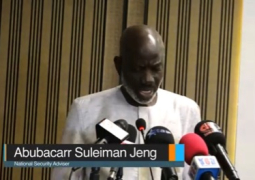
“The punishment for the five counts of obtaining money by false pretence is 3 years and that of the four counts of frauds on sales on property is 2 years respectively. I am mindful of the fact that the convict is a first-time offender and that he is of old age. For these reasons, I shall exercise my discretion under Section 29 ( 3 ) of the Criminal Code and impose a non-custodial sentence instead of imprisonment. Accordingly, the convict is sentenced on the five counts of obtaining money by false pretence to a fine of D20,000 in default to serve one year imprisonment. On the four counts of frauds on sales on property, he is sentenced to pay a fine of D15,000 in default to serve nine months imprisonment,” she stated.
She ordered the convict pursuant to Section 145 of the CPC to compensate the victims as follows: Wuye Fayenkeh the sum of D350,000; Fatoumatta Fatty the sum of D350,000; Ebrima Fatty the sum of D350,000; Alfusianey Fatty the sum of D450,000 and Lalo Fatty the sum of D300,000.
She further noted that the complainants are at liberty to enforce the said payments by levy of distress or through the civil process.
Reading her judgement, she started with the testimonies of the prosecution witnesses namely, Wuye Fayenkeh, Lalo Fatty, Haja Jawneh, Pa Saidou Jallow, Jammeh Kebbeh, Alhaji Saikou Kanteh and Lawyer Edward Anthony Gomez. She also dwelled on the testimonies of the defence witnesses namely, Durra Jallow, Samba Jallow and Moriba Danso.
She posited that at the close of the defence case, both parties filed written addresses. She went on to say that she had carefully considered the charges in the matter, the evidence adduced by the parties and the written addresses filed by both parties.
She said that it is trite position of the law that to secure conviction of the accused person, the prosecution must not only connect the accused to the offence but in doing so, the standard of proof required is proof beyond reasonable doubt. She further disclosed that this means that the prosecution must prove all the ingredients of the offence for which the accused was charged with.
She added that it is well settled that in a criminal trial, the prosecution could discharge the burden placed on it by law in any of the following well established and recognized manners namely, by the confessional statement of the accused which passes the requirement of the law; or by direct evidence of eye witnesses who saw or witnessed the commission of the crime or offence; or by circumstantial evidence which links the accused and no other person to or with the commission of the crime or offence charged.
She noted that the offence of obtaining by false pretence created by Section 288 of the Criminal Code is constituted or committed upon the existence of the following: That there was a false pretence; that the pretense emanated from the accused person; that it was false; that the accused knew of its falsity or did not believe in its truth; that there was an intention to defraud; that the thing was capable of being stolen and that the accused person induced the owner to transfer his whole interest in the property.
For the offence of frauds on sale of property as charged pursuant to Section 293 ( c ), she revealed, the offence is committed upon the existence of the following ingredients: That the accused was a seller of a property; that the accused made a false statement or concealed a material fact as to the title offered; that the accused did so with intent to induce the purchaser to accept the title offered or produced and that there was an intention to defraud.
The principal magistrate posited that for the accused to be liable for the offence of obtaining by false pretences, there must be evidence that he made representations to the various complainants to have the capacity to sell plots of land of different dimensions situate at Sinchu Sorrie, from which basis the complainants believed him and subsequently parted with their monies. She said that the accused while making the representation knew he did not have such capacity or link to carry out the represented facts. “It must also be proved that the intention of the accused is to defraud the complainants,” she told the court.
She went on to say that there was evidence that the accused at the time of selling the plots of land told the various buyers presented himself to be rightful owner of the said plots, and that there was evidence that the accused did not deliver possession of the plots he sold to the various complainants.
She stated that it was important to point out that the ways of proving ownership to land in this jurisdiction had been settled by the Supreme Court of The Gambia in the case of Fatou Badjie & Others versus Joseph Bassen where it was held that proof of ownership to land can be done in any of the five ways: By traditional evidence; by production of documents of title; by acts of the person claiming the land; by acts of long possession and by proof of possession of connected or adjacent land.
The presiding magistrate further noted that to prove that the plots of land in question sold to the victims were not owned by the accused person, the prosecution led evidence through Jammeh Kebbeh and Alhaji Saikou Kanteh.
She revealed that in his evidence, the accused claimed that the plots of land he sold to the victims belong to him. “While conceding that the burden is on the prosecution to prove the ingredients of the offence charged beyond reasonable doubt, there is no doubt that evidential burden shifts, and it is trite as well, that the accused person has the evidential burden of establishing his assertions that the plots he sold to the victims belong to him. Section 145 of the Evident Act is quite categorical on this,” she posited.
She stated that from the evidence of the accused, it was apparent that he was not only relying on documentary evidence, but also traditional history. She added that a scrutiny of Defence exhibit 1 which was titled ‘Certificate of Ownership’ would reveal that it was a document indicating a transfer of land from Alhaji Talibuya Jallow, alkalo of the village of Darailimbo (Sinchu Sorie), to Durra Jallow, the accused. She went on to say that it was thumb-printed and stamped with alkalo’s stamp, and it indicated the size of the land to be 400m by 200m which gives a total area of 80,000 square meters. However, she further disclosed, this document appeared to be quite incomplete with respect to the requisite transfer formalities. “It is apparently not endorsed by the District Chief nor approved by the Local Government officer and most importantly, it has no sketch plan attached to it showing the exact location of the land. Therefore, it is this court’s view that defence exhibit 1 is of no probative value in this case,” she declared.
She said that for the accused to rely on any document establishing ownership of the suit land, he must be to show a duly authorized and executed transfer of ownership document at least. “The accused has not even shown in his defence that he has not been paying rates nor did he tender any to at least add weight to his claim of ownership of the plots of land he sold to the victims,” she told the court.
On his traditional history, the presiding magistrate stated, the accused claimed that the land was their farmland and he inherited it from his father. She noted that the accused also alleged to have demarcated plots for many people. She added that the law is trite that in proof of title by traditional evidence, the accused should prove in some chronological sequence or detail the ownership of the suit land from the ancestors, and there should be no broken period in the chronology but there must be chain of connection.
“From the evidence of the accused, there is no chronological sequence detailing ownership of the land from his ancestors. Besides, long period of farming on a land is not tantamount to ownership of the land. It may however be an advantage on the part of the person claiming same but does not certainly establish ownership,” she posited.
She said that considering the evidence of the defence as well as that of PW 4, PW 5 and PW 6, the evidence of the prosecution regarding ownership of the plots of land sold to the victims was more probable, and that the evidence of the accused regarding ownership was weak and inconsistent. “Thus, in light of the above analysis, I am convinced that the plots of land sold to the complainants do not belong to the accused person but instead PW 6 and I hold same as a fact. The presentation of the accused to the complainants alleging ownership of the plots of land sold to them was false and the accused knew of this falsity,” she added.
In light of the above premises, she noted, it was her view that the prosecution had proved the ingredients of the offence of obtaining by false pretence.
Principal Magistrate Isatou Janneh-Njie noted that it had already been held as established above that the accused was a seller of a property and he sold plots of land to Wuye Fayenken, Fatoumatta Fatty, Ebrima Fatty, Alfusainey Fatty and Lalo Fatty. “The accused falsely made a statement that these plots sold to them were owned by him and this was not the case. As already held as established, the intention of the accused was to induce the various purchasers to accept the title offered with the intention to defrauding them of their monies,” she declared.
She further said that on the above premises, she found that the prosecution had equally proved its case against the accused person for the offences of frauds on sale of property. She posited that she found the accused guilty and accordingly convicted him as charged.
ASP Jahateh threw his weight behind the IGP.





